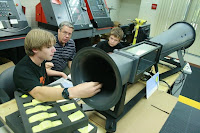The team of four manufacturing post–secondary educators, and 4 middle school science teachers led the leadership of the museum’s development team with critical elements of manufacturing that should be included in the curriculum. They also offered specific ideas for activities and lessons that align with science and technology standards. I was excited to participate and offer my insights, meet new friends, and was highly impressed by the number of educators and curriculum developers engaged in the project.
Engaging the middle school crowd with manufacturing, even with rich media (Design Squad), is quite a challenge, and we are all anxious to review the first draft products. Despite the complexities, the project bears notice, and it will be interesting to track what they develop in the upcoming months.
This last newsletter of 2009 has stories about our jointly sponsored Nanotech Day at USF; our new “Made in Florida” learning challenges based on ConMed Linvatec in Pinellas County, a new “STEM at Work” challenge, a spotlight on the Teacher Quest program facilitated by Florida’s Technological Research and Development Authority, and a new monthly side bar “Did you know?” that captures important facts and data bits that are important to many of our stakeholders.
We end the year digging into a new phase of our curriculum alignment work and have chosen the WIDS (worldwide instructional design system) program design software to help us with this task. Through this effort, we anticipate showcasing alignment between external standards, state curriculum frameworks, course outcomes for both secondary and post secondary programs in a robust system that will allow us to quickly cross reference new competencies, standards and much more.
I am sending warmest wishes for a safe holiday to all of our FLATE stakeholders, partners, families and friends from the FLATE staff and working team.
Marilyn, Marie, Janice, Dave, Lourdes, Jodi, Teja, Kim, Brad, Richard, Phil
Wayne, Jennifer, Danielly, Colin, Patti, and Constantine.

































 Florida Association for Career and Technical Educators' annual conference and trade show has been an effective tool in providing career and technical educators across Florida with resources to foster “professional leadership and partnerships that prepare individuals to participate in a world class workforce.” The 43rd Conference from Aug. 4-6 in Orlando was an extension of its commitment to these very principles!
Florida Association for Career and Technical Educators' annual conference and trade show has been an effective tool in providing career and technical educators across Florida with resources to foster “professional leadership and partnerships that prepare individuals to participate in a world class workforce.” The 43rd Conference from Aug. 4-6 in Orlando was an extension of its commitment to these very principles!




 FLATE and Hillsborough Community College jointly hosted the National Science Foundation-sponsored Regional Energy Industry Forum. This day-long event was held June 30 at HCC’s South Shore Campus in Ruskin, and aimed at identifying and defining new energy technologies and services in Florida. Facilitated by the NSF Advanced Technology Environmental and Energy Center (ATEEC) the meeting of energy, industry and education experts was one of a series of 8 energy-related nationwide forums to develop comprehensive regional snapshots of the emerging energy sector.
FLATE and Hillsborough Community College jointly hosted the National Science Foundation-sponsored Regional Energy Industry Forum. This day-long event was held June 30 at HCC’s South Shore Campus in Ruskin, and aimed at identifying and defining new energy technologies and services in Florida. Facilitated by the NSF Advanced Technology Environmental and Energy Center (ATEEC) the meeting of energy, industry and education experts was one of a series of 8 energy-related nationwide forums to develop comprehensive regional snapshots of the emerging energy sector.


